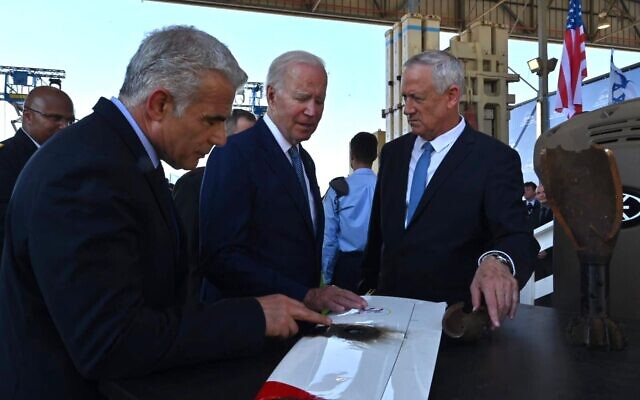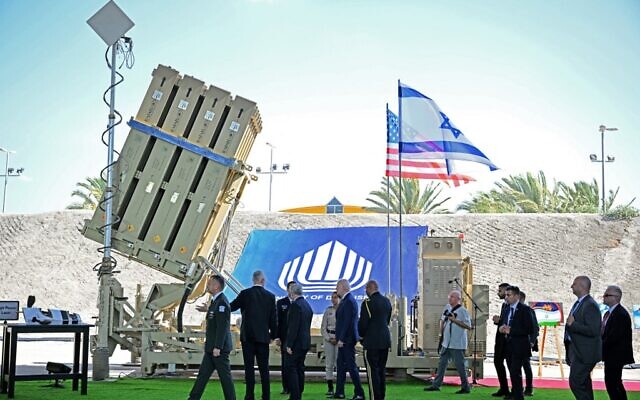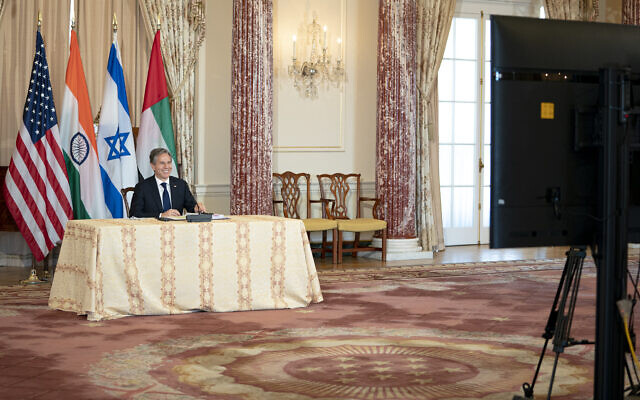 Biden to back renewing US defense package for Israel — top administration official
Biden to back renewing US defense package for Israel — top administration official
JACOB MAGID
Support for extending 10-year MOU signed in 2016 to be part of ‘Jerusalem declaration’ Biden and Lapid will sign Thursday along with commitments to support Ukraine, Abraham Accords.
 Defense Minister Benny Gantz, right, presents US President Joe Biden with the wing of a drone intercepted by the Iron Beam laser defense system, as Prime Minister Yair Lapid (L) looks on at the Ben Gurion Airport, July 13, 2022. (Ariel Hermoni/Defense Ministry)
Defense Minister Benny Gantz, right, presents US President Joe Biden with the wing of a drone intercepted by the Iron Beam laser defense system, as Prime Minister Yair Lapid (L) looks on at the Ben Gurion Airport, July 13, 2022. (Ariel Hermoni/Defense Ministry)
Prime Minister Yair Lapid and US President Joe Biden will sign a joint declaration on Thursday that will include the administration’s backing for extending the massive defense package Washington provides to the Jewish state, according to a senior US official.
The $38 billion Memorandum of Understanding (MOU) was signed in 2016 under the Obama administration when Biden was vice president. The 10-year agreement went into effect two years later, so is not even 50% complete, but such MOUs take time to negotiate and, as such, are planned years in advance.
The senior US official briefing reporters Wednesday said the joint declaration would “note our ongoing support for [the 2016 MOU] and support for extending it at an appropriate time.”
Israeli officials briefing reporters ahead of the trip referred to the joint statement as the “Jerusalem Declaration” and spoke more broadly of its emphasis.
The senior administration official said Wednesday that in addition to backing Israel’s security, the declaration will also see the sides commit to never allowing Iran to obtain a nuclear weapon. The two leaders will express support for the Abraham Accords and Israel’s integration in the region. The declaration also highlights shared concerns for global security issues, such as Russia’s invasion of Ukraine, with the leaders offering their support for Ukrainian sovereignty.
The Palestinian issue was not included in the main points of the declaration highlighted by the senior US official.
 US President Joe Biden (C) walks towards an Iron Dome defense system (R) during a tour at Ben Gurion Airport near Tel Aviv Israel on July 13, 2022. (MANDEL NGAN / AFP)
US President Joe Biden (C) walks towards an Iron Dome defense system (R) during a tour at Ben Gurion Airport near Tel Aviv Israel on July 13, 2022. (MANDEL NGAN / AFP)
Contrary to his predecessors, Biden is seen to have largely deprioritized the Israeli-Palestinian conflict on his foreign policy agenda due to a belief that the parties are not ready for high-stakes peace talks.
The president expressed his support for a two-state solution in his speech upon landing at Ben Gurion airport on Wednesday at the start of a four-day trip to Israel, the West Bank and Saudi Arabia. However, he added, “I know it’s not [feasible] in the near term.”
The Jerusalem Declaration was hyped-up by Israeli officials briefing reporters a day earlier, but the US administration official acknowledged that “a lot will look familiar,” as many of the positions have already been voiced by the parties in the past.
However, the US official added that there are some new angles to the declaration as it contains “a commitment to look at the future,” with references to extending the 2016 MOU.
Turning to Thursday’s virtual meeting between Biden, Lapid, UAE President Mohamed bin Zayed and Indian Prime Minister Narendra Modi, the official said it would include an announcement of $2 billion for agricultural parks in India that Abu Dhabi will help fund and that will use Israeli technologies.
The new forum of countries that the White House has labeled I2U2 will allow US allies to better address global challenges by working together, the official said.
 US Secretary of State Antony Blinken takes part in a Zoom call with the Foreign Ministers of Israel, India and the UAE on October 18 2021 (State Department)
US Secretary of State Antony Blinken takes part in a Zoom call with the Foreign Ministers of Israel, India and the UAE on October 18 2021 (State Department)
Asked to comment on the COVID protocols for the trip, which were used to explain the directive issued to Israeli ministers at the welcome ceremony not to expect handshakes from Biden, the senior US official insisted that no such guidance had been issued on the US end.
After first fist-bumping Lapid on the tarmac, Biden went on to periodically shake the hands of other ministers
Some analysts had initially speculated that the directive reported by Hebrew media was put in place to prevent Biden from having to shake the hand of Saudi Crown Prince Mohammed bin Salman later this week in Jeddah. The US has sought to gingerly improve ties with Riyadh after Biden vowed during his campaign to treat the Gulf kingdom like a “pariah” over its human rights record.
Zawartość publikowanych artykułów i materiałów nie reprezentuje poglądów ani opinii Reunion’68,
ani też webmastera Blogu Reunion’68, chyba ze jest to wyraźnie zaznaczone.
Twoje uwagi, linki, własne artykuły lub wiadomości prześlij na adres:
webmaster@reunion68.com
